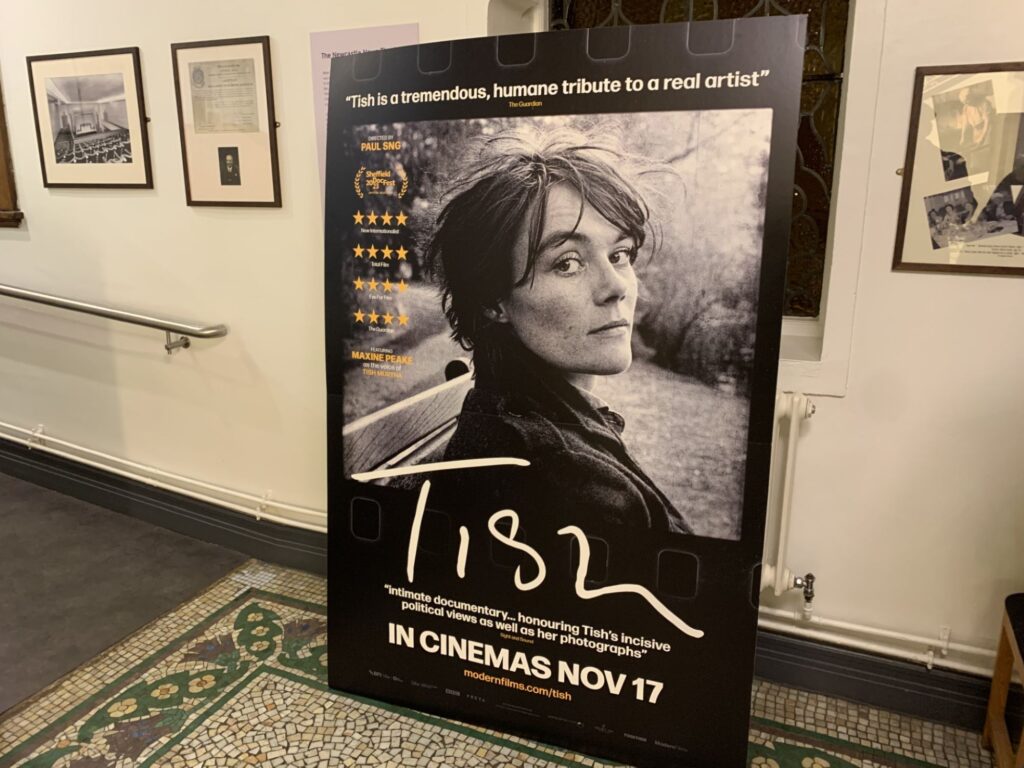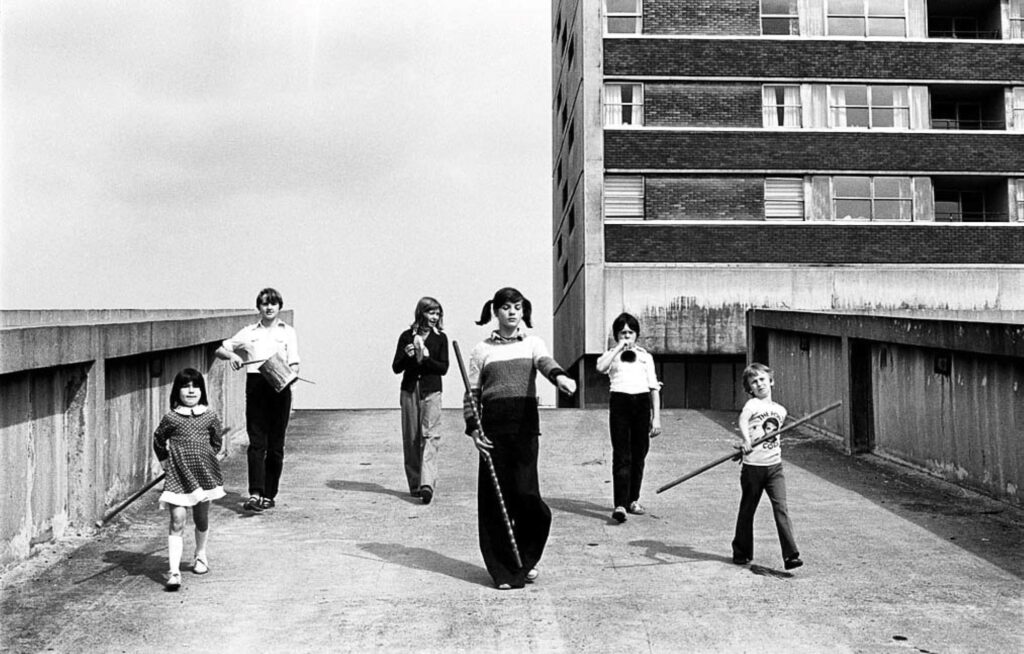
At the end of last year, a series of screenings of a film called Tish packed out Tyneside Cinema. Ahead of its small screen premiere on BBC4 next month (April), here’s what David Whetstone had to say about it*.
*This is how the review appeared on Cultured. North East in November. Any references to remaining screenings at Tyneside Cinema are now out of date.
It’s late to be recommending this but there are still some screenings of a wonderful film called Tish at the Tyneside Cinema and it’s easily worth 90 minutes of anyone’s time.
The film is a documentary recalling Tish Murtha, the naturally gifted photographer who documented dereliction and demolition in Elswick, Newcastle, in the 1970s and ’80s.
Despite having been born in South Shields, she grew up in Elswick and knew it like the back of her hand, even though much of it was fast disappearing around her.
In one of the big empty houses which were playgrounds for Tish and her siblings – she was the third of 10 – she once found a camera.
There was no film in it but without this fateful discovery you wonder what would have happened.
Would anyone outside her large family remember Tish Murtha now? Would anyone even clearly remember the post-industrial ruin that was this part of Newcastle at that time?
Tish didn’t set out purposely to document it.

Instead she took photos of the people, mostly her young relatives, making what fun they could out of it, jumping out of windows, bouncing on wrecked cars and generally fooling around.
Black and white images of this uninhibited rag-tag gang are frozen moments of joyous mischief. Even in poverty and amid abject surroundings, kids will make the best of things. The photos make you smile.
What’s clear in all of them is that Tish had an eye for an arresting image. She derided ‘pretty’ pictures but something about the way she instinctively framed these early shots make them aesthetically pleasing.
What she did with a camera lifted her photos way above ordinary.
The film ends with the Tate acquiring some of them and there seems no greater irony than these pictures of beaten up Elswick on display in a building known for great art.
Tish’s shots belong there as terrific examples of documentary photography.
- Read more: Interview with Tish director, Paul Sng
- Read more: You’re doing alright, Jack
Directed by Edinburgh-based filmmaker Paul Sng, the film goes behind the photos. Ella Murtha, Tish’s daughter, takes us on a journey of discovery, interviewing Tish’s younger sister, Eileen, and three of her brothers, one of whom has since passed away.
These are touching encounters. The boys look back at the early years, helping their dad find scrap metal amid the wreckage of former homes and seeing it as a treasure hunt. There was never any thought back then of the risk to life and limb.
All, we now hear, had dreams that were crushed by 1980s mass unemployment and the burden of an Elswick address.
One wanted to be an actor but ended up with a prison record. Government youth employment schemes led to them and others like them clearing weeds or sweeping rubbish while being bullied and abused by their supervisors.

There was an understandable well of anger in Tish Murtha which found its way into her photography. She documented the struggle of workers to keep their jobs and the living conditions of the urban poor.
Ella, guardian of Tish’s archive, was the apple of her mother’s eye, as Eileen and friends from Tish’s busiest early years assure her.
But clearly it plays on Ella’s mind that towards the end of her life Tish was earning next to nothing and choosing between heating and eating. She died of a brain aneurysm in 2013, a day short of her 57th birthday.
In the film, old friends and fellow photographers – including the late Chris Killip and Mik Critchlow – marvel at her talent and smile at their memories of her.
At the age of 20 Tish was persuaded to enrol on a documentary photography course at Newport in South Wales, which can’t have been easy for her.
Even though there is no filmed interview with Tish, and back view reconstructions stand in for genuine footage, she comes alive in the documentary, largely due to the gentle probing of her daughter and the colourful and affectionate memories of the interviewees.
One fellow student remembers offering to share accommodation, certain she intended to kip down in the college for the night once everyone had left.
Former lecturers remember her dedication and her aversion to compromise.
If some of the photos in the film are familiar, the chances are that Tish’s writing, read by the actress Maxine Peake, will be less so. In words as in pictures, she was perceptive, eloquent and fiercely principled.
Even the people at Side Gallery, who you’d imagine to be champions of her work, somehow got on the wrong side of her.
Tish embarked on projects to document youth unemployment and juvenile jazz bands, of which she did not approve, and spent time in London having been commissioned to photograph sex workers.

In one letter she recalled being chased by a transvestite with an axe.
Even though there is no filmed interview with Tish, and back view reconstructions stand in for genuine footage, she comes alive in the documentary, largely due to the gentle probing of her daughter and the colourful and affectionate memories of the interviewees.
It’s quite heartrending that the last words read by Maxine Peake are Tish’s applications late in life for various mundane jobs in which, almost as an afterthought, she says she’s also “a keen photographer” and develops her own photos.
This, the woman who now has her work in a celebrated national collection.
Tish, which was supported by the British Film Institute’s Doc Society Fund and Screen Scotland, will be screened on BBC4 on April 1.
Read David Whetstone’s interview with its director, Paul Sng here.











